September 25, 2025 – Departure from Korea, Arrival in the United States
Hello. Today is a day of traveling all day to New York for a lecture tour in the eastern region of North America.
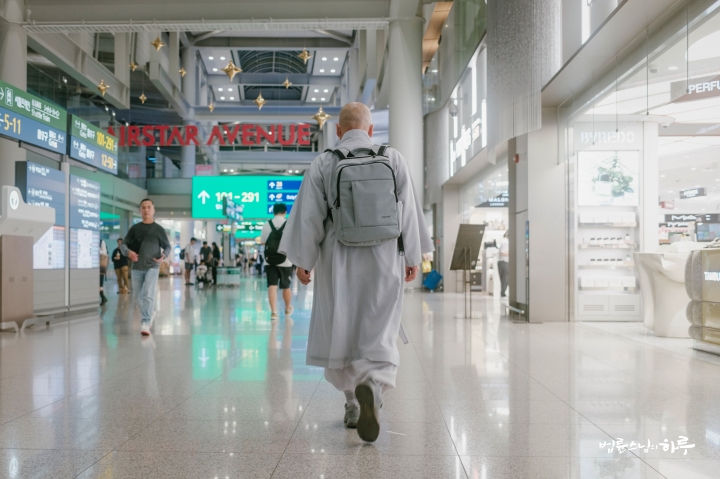
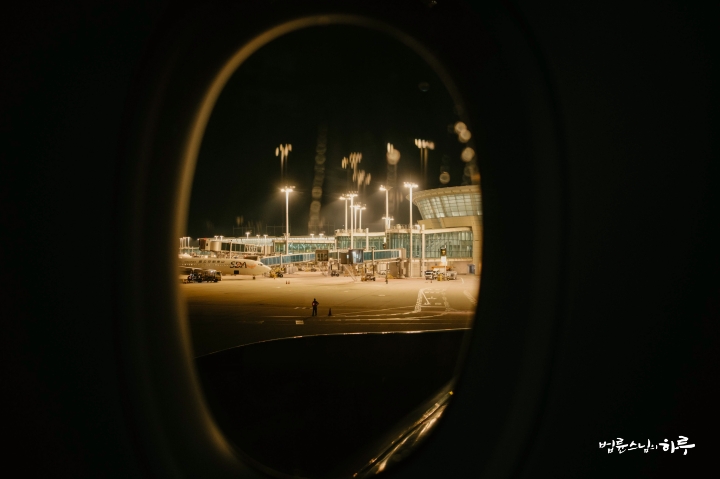
Sunim boarded a flight to New York, USA, departing from Incheon International Airport at 9:05 PM on the 25th. After spending the night seated on the plane and flying for 13 hours and 30 minutes, he arrived at New York’s JFK International Airport at 9:40 PM local time on the 25th.


After completing immigration procedures, it was almost 11 PM when he exited the airport.
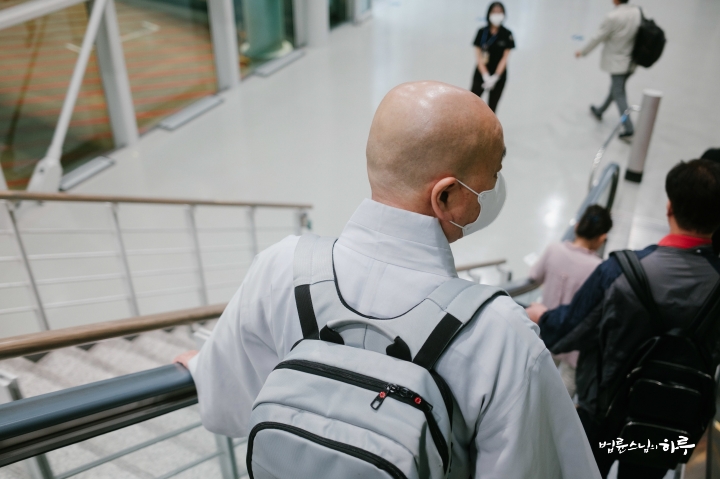
Kim Myung-ho, a member of New York Jungto Society, Dharma Teacher Myodeok who had arrived in New York yesterday after completing the Sharing Retreat in Europe, and Dharma Teacher Beophae who oversees overseas lectures, warmly welcomed Sunim after his long journey.
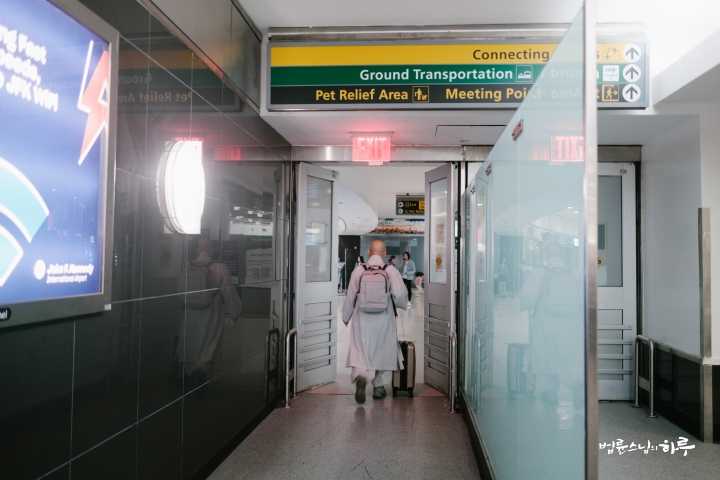
“Thank you for your hard work coming such a long way.”
New York’s JFK Airport is a very large international airport representing New York, with terminals numbered 1 through 8, each operating its own airlines and facilities. The airport is quite large but has been under construction for several years, making it very congested.

They immediately got in a car and arrived at Kim Myung-ho’s residence, today’s accommodation, at 11:30 PM where they unpacked. The members greeted Sunim, who was visiting the eastern region of North America again after a year, with three bows.
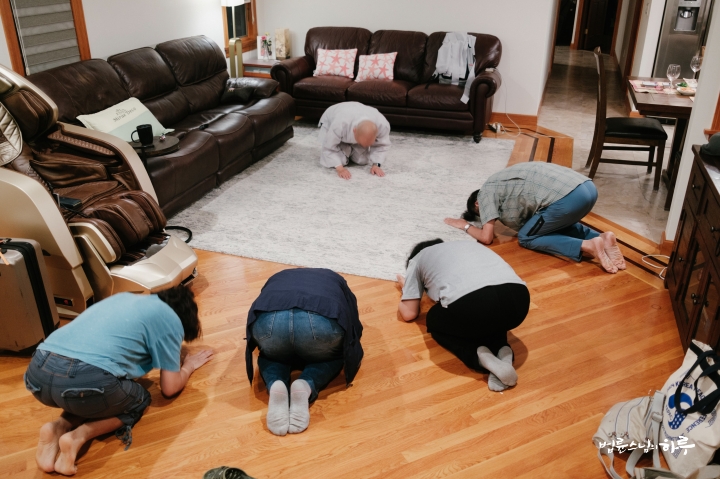
After exchanging greetings, they discussed the North American East Coast lecture tour schedule starting tomorrow and the Washington D.C. visit scheduled for next week, concluding today’s activities.
Since there was no Dharma talk today, I’ll conclude by sharing a dialogue between Sunim and a questioner from the Weekly Dharma Assembly the day before yesterday.
Trump’s Pressure and North Korea-China-Russia Alliance… What Will Be the Future of South Korea?
“There is daily news about international affairs, and there are many analyses by experts. I suggest you refer to those first. In the 1960s, the United States’ GDP accounted for 40% of the world’s GDP at times. However, currently, the U.S. share of global GDP has decreased to about 25%. While the United States has played the role of world police until now, it has become unable to handle it anymore due to insufficient power. No one asked them to be the world’s police, but the United States took on that role voluntarily and is now complaining that they spent too much on defense for their allies. The United States has been spending more than 5% of its GDP on defense to ensure the safety of its allies, while the allies have only spent 1% to 2% on defense to protect their own countries while reaping all the benefits. They question why they should protect Korea with U.S. defense spending when the TV in their room is Samsung and the refrigerator is LG. So they’re saying Korea should take care of protecting itself, and they’ll withdraw U.S. forces from Korea. If U.S. forces in Korea are needed, Korea should pay all the stationing costs. Currently, our country pays the United States about 1 billion dollars annually, over 1.4 trillion won in Korean currency, for U.S. forces stationed in Korea. But now they’re demanding 10 times that amount, 10 billion dollars.
The United States also has complaints about trade issues. While Korea has benefited from trade with the United States, the United States has been running a deficit in trade with Korea. Since the United States has suffered losses, they’re now saying Korea should pay tariffs to the United States, or if they don’t want to pay tariffs, they should build factories and invest in the United States. If all countries responded jointly to these demands, there wouldn’t be a big problem. However, while complaining, each country is looking for its own way to survive. They’re negotiating separately, wanting to look good to the United States so their country can have lower tariffs, asking ‘Can’t you give us special treatment?’
Our country has a Free Trade Agreement (FTA) with the United States, so there were no tariffs. To impose tariffs, the free trade agreement must first be terminated, but if the United States unilaterally imposes tariffs without such procedures, it could be considered a violation of international law. In principle, this should be resolved through litigation at the International Court of Justice, but countries think they’ll suffer losses if they fall out of favor with the United States. If the economy suffers because they fall out of favor with the United States, domestic public opinion will criticize them for failing in diplomacy with the U.S., potentially overthrowing the government. That’s why the whole world is watching the United States carefully. In fact, India received 50% tariffs for not yielding to the United States, and Brazil also received 50% tariffs for resisting U.S. interference in domestic affairs. This has made it difficult for companies worldwide exporting to the United States to sell their industrial and agricultural products due to tariffs, but there’s nothing they can do about it.
When someone who doesn’t follow the law has no power, those with power can enforce the law, but conversely, when powerful people don’t follow the law, the law cannot be enforced. In a family, if a child comes home late, the father can establish order by not giving meals or allowance, but if the father doesn’t keep promises, the child has no way to correct it. No matter what promises are made, if powerful people don’t keep them, there’s no solution. The world is now in this situation.
So many predicted that the U.S. unipolar system would collapse and become multipolar, but some now see the danger of moving toward a non-polar system. In other words, rather than a hegemonic structure like a U.S.-China bipolar system, it could become a chaotic international society with no center anywhere. Whether this situation will make America great again and recreate Pax Americana, or whether the United States will decline and the world will become China-centered, or whether China will also collapse together creating a non-polar system with no center anywhere, is currently difficult to predict. This is because the United States will elect a new president after four years, and then policies will change again.
The United States is now not only violating international law but also domestic law. Even if the U.S. judiciary rules something is wrong, it’s useless if those in power don’t comply. When powerful people don’t follow the law, legal order collapses. If the United States doesn’t follow the law, international legal order collapses, and if those in power don’t follow the law within the United States, domestic legal order also collapses. This leads to a chaotic society. As the saying goes, ‘Even bad laws are laws,’ for society to be stable, changes must be made within the framework of legal order. But if you ignore the law and push through reforms, it becomes a ‘revolution.’ In Korea too, the previous government tried to impose emergency martial law to do things their way while ignoring the law, but failed and fell into chaos. We cannot know what results will occur if the current government pushes through reform legislation while ignoring the constitution. So we can predict that chaos will gradually worsen both domestically and internationally. Whether this chaos will lead to collapse or enter a stable trajectory through appropriate compromise remains unknown. Ultimately, it will depend on how much leaders of each country and domestic politicians from both parties compromise and cooperate.
Currently, extremists have significant influence domestically as well. One side is shouting ‘Yoon Again,’ while the other side insists on rooting out and eliminating insurrectionist forces. Even when ruling and opposition floor leaders reach agreements in the National Assembly, if it differs from their claims, they swarm like bees sending text bombs to break agreements and reverse the situation. This can be called ‘mob dictatorship.’ They think it’s okay to ignore mutual political promises backed by the clamor of crowds. Interpreted positively, it could be called ‘direct democracy,’ but if this develops negatively, it becomes ‘fascism.’ When crowds gather in masses and clamor, even the law becomes powerless. It’s not quite there yet, but signs are increasingly showing.
There are three scenarios we can anticipate going forward. First, there’s a possibility that the U.S.-China power clash could expand into a world war. Second, local wars occurring in various places – Ukraine and Russia, Israel and Palestine, the Korean Peninsula, the Taiwan Strait, Pakistan and India – could spread and escalate into major wars. Third, among these, if conflict occurs on the Korean Peninsula, the risk of it leading to a world war is greatest. This is because South Korea has formed the Korea-U.S.-Japan alliance, and North Korea has formed the North Korea-China-Russia alliance, creating a confrontation among the world’s four major powers. While the Palestinian conflict won’t bring about a world war, conflict on the Korean Peninsula carries a very high risk of triggering a world war.
Therefore, above all, we must manage peace well. Unification is important, but what’s most important now is not unification but preventing war by any means. Now more than ever, preserving peace is crucial. While whether the Korean Peninsula is one country or two countries was an important issue in the past, preventing war is now the top priority. We must stand on the perspective that if relations improve on this foundation, we can move toward unification. So now we must take various measures to prevent war from occurring amid the circumstances surrounding the Korean Peninsula. We must prepare sufficient defense against enemy attacks, while simultaneously engaging in dialogue and cooperation to prevent war. Neither strong security alone nor dialogue alone guarantees peace. Now is the time to do both. While building strength in preparation for emergencies, we must ensure through dialogue that hostility doesn’t arise so that strength doesn’t need to be used. The current Lee Jae-myung government appears to be trying to move in this direction.
However, because we are incorporated as part of America’s East Asia strategy and Indo-Pacific strategy, the reality is that we cannot ignore U.S. demands. But if we comply with all U.S. demands, conflicts with China will intensify. The United States is far from China, but we are right under China’s nose. So we cannot rule out the risk of U.S.-China conflicts spreading to Korean Peninsula disputes. While we should basically cooperate in our alliance with the United States, we must avoid becoming hostile to China. Otherwise, our safety is threatened. Some level of cooperation with North Korea or China is necessary. This isn’t because of being pro-North Korean or a pro-China government, but rather a wise stance to protect our safety.
Regarding the U.S. strongly pressuring to increase U.S. forces in Korea stationing costs by 10 times, we could pay 10 times the stationing costs, or we could be bold and say ‘Withdraw if you want!’ However, being bold is a very dangerous attitude. If U.S. forces actually withdraw, great chaos would inevitably follow. However, U.S. forces in Korea aren’t stationed just for us. They play an enormously important base role in America’s strategy toward China. The United States might need to stay even if they pay all the stationing costs. Ultimately, what matters is who needs whom more. In this situation, we can say ‘If America needs it, America should pay!’ and America can respond ‘Don’t you need us? Then we’ll withdraw!’ If we grab onto America’s coattails, we’ll have to pay more stationing costs, and if we act tough saying ‘Withdraw if you want!’ America might get offended and stab us in the back. So I think it’s best to say ‘Do as you please, America.’ If America wants to keep U.S. forces in Korea, we can say ‘We’ve maintained security through America, so we’ll cooperate anytime.’ In that case, America would have to pay the stationing costs. Conversely, if they say they’ll withdraw, don’t hold them back but say ‘Thank you for everything. We received much help when we were powerless. We’re truly grateful. Now that we can make a living, we’ll protect our own security. Please move to where America is needed. We’ll cooperate closely on anything necessary.’ Then neither side feels bad. This kind of push and pull is needed.
Until now, conservative forces unconditionally grabbed onto coattails and took on financial burdens, while progressive forces shouted ‘Leave if you want!’ adding anti-American sentiment and hurting feelings. Now we shouldn’t tell them to leave or stay, but just say ‘We respect you, so do as you need.’ If they say they’ll withdraw, we’ll take responsibility for our own defense, and if they say they’ll stay, we can say we’ll provide locations anytime. I think this attitude might reduce U.S. forces in Korea stationing costs somewhat. In that sense, I think the talk of ‘Shouldn’t we take responsibility for our own defense?’ has emerged.

In any case, when engaging in diplomacy, one must not speak recklessly. Diplomatic statements should be made ambiguously so they can be interpreted differently depending on the situation later. Even if things become unfavorable later, you should be able to say, ‘Actually, that’s not what I meant; this is what I intended.’ This is the essence of diplomacy. It’s not cowardice or deception, but a strategy to protect national interests. Internally, you must calculate both scenarios – one where withdrawal is acceptable and another where additional costs might be incurred. You push and pull in negotiations as far as possible, and if it doesn’t work out, you might have to pay the price. While making thorough preparations internally, you need an attitude that accommodates the other party’s sensitivities externally to minimize adverse effects.
Of course, North Korea doesn’t have that negotiation style. North Korea is straightforward, saying ‘Fine! If you want to fight, let’s fight!’ They take the stance of ‘So what if I die? You’ll die too!’ The reason they act this way is because while they’re hungry, they have extremely strong pride. But we’re different. Since our citizens have no intention of going hungry, it’s difficult to maintain our pride. Because we prioritize living well and eating well, we inevitably become somewhat servile.
Which would you choose? Would you live somewhat servilely while eating and living well? Or would you maintain your pride and dignity even if it means going hungry? This is the difference between South and North Korea. North Korea chose to maintain their pride and go hungry, while South Korea chose to be well-fed at the cost of being somewhat servile. It feels unpleasant, but we make this choice because we don’t want to be hungry. From what I can see, there aren’t many South Korean citizens who would maintain their pride at the cost of going hungry. But politics isn’t about individual issues – it’s about reflecting the will of the entire population, isn’t it? While it may seem somewhat servile, wanting to live with full stomachs appears to be the current situation of South Korean citizens. That’s why I think it’s necessary to respect the will of the people.”
“Yes, I understand well. I couldn’t trust the videos on YouTube because they were too caught up in labeling things as left or right. But after listening to Sunim’s words, everything has become clear. I’ve come to think that I should live accepting what needs to be accepted. Thank you.”





